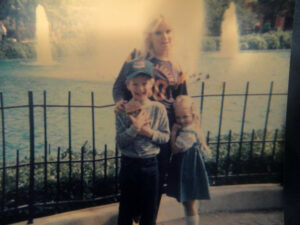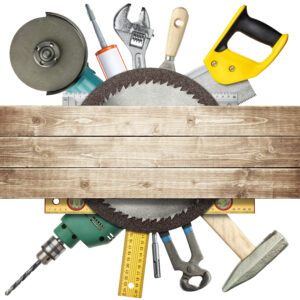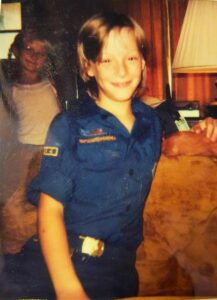Interview With Christopher Stevenson
 I began following Christopher Stevenson on Twitter a little over a year ago. While I don’t always agree with his (very) strong opinions–Christopher calls himself a contrarian, after all–I always appreciate that his tweets make me feel. Sometimes his tweets made me laugh. Sometimes they make me angry. Often they touch my heart. I asked Christopher to be our first male interviewee because of one such tweet thread. Please join Christopher and me as we chat about the positive influence of women in his life, the teachers and librarians who saved him, and the high costs of gender roles.
I began following Christopher Stevenson on Twitter a little over a year ago. While I don’t always agree with his (very) strong opinions–Christopher calls himself a contrarian, after all–I always appreciate that his tweets make me feel. Sometimes his tweets made me laugh. Sometimes they make me angry. Often they touch my heart. I asked Christopher to be our first male interviewee because of one such tweet thread. Please join Christopher and me as we chat about the positive influence of women in his life, the teachers and librarians who saved him, and the high costs of gender roles.
Diane: I’ve never interviewed a man for WomanPause before—and hadn’t ever planned to. I thought of you, though, because of your life experiences—with women. You and I became friends on Twitter. I’d been following your tweets for a while when one particularly stood out. It was your response to a spirited thread about women’s shelters and about women with male children who are seeking safe haven. What does a shelter do when another woman or women already finding refuge there are triggered by a male child of another resident?
Many on the thread spouted strong opinions—without having direct experience in the matter. (No surprise there.) They simplified the issue (no surprise there either) and came out in strong support of the women who felt unsafe. Of course, we all support women feeling safe, but—without vehemence or self-rightousness (so prevalent in these online discussions)—you shared your own childhood experience. Your words moved and intrigued me. So, I invited you to share your thoughts with me on WomanPause.
And here we are today.
Welcome.
Can you tell us a bit about your childhood experiences at women’s shelters?
“We’re Not Particularly Kind to Single Mothers”
Christopher: Yes, we went to shelters when I was between the ages of eight and sixteen. My mom’s second husband, my stepfather Rick, was abusive. It’s straightforward: he wanted to be this hillbilly redneck person and drank a lot, and sometimes did cocaine. We lived in a trailer because he wanted to fit this particular aesthetic and he had a (broken down) monster truck—a 1980s version of a monster truck, which is a Baja jacked-up style pickup. Sometimes it was fun, like yaaaay! I’m in a grit lit novel, but when he got drunk it became more like Hellraiser.
The abuse ran the range. If you could imagine it happening, it probably happened. Psychologists have this term Adverse Child Experiences (ACE), which are traumatic events that happen before a child is eighteen. I have a high score of 10. Yeah, it was hell, it was living hell.
The first time we stayed at a battered women’s shelter—that was when I learned what the word battered meant—I was eight years old. They kicked us out. We showed up in the morning, we were supposed to stay there, but one of the women who was staying there was triggered by my presence. I remember at the time—as an eight-year-old—being like, “Oh yeah, of course that means we have to go back to Rick.”
And so mom went back with him.
He had a prior record, or prior troubles with the law, but she went back with him, anyway. I think the obvious reason is because she simply just didn’t have material access to get us out of there. That’s often the case with single mothers. We’re not particularly kind to single mothers.
So, there was that shelter that kicked us out. There were a number of shelters who wouldn’t take us.
In one of the shelters in Miami (Florida) when I was 12, I had to pretend I was 10.
“If Women Are Expected to Be Nurturing All the Time, What Can They Do Except Nurture?”
 Diane: What did those experiences say to you about being a man or a young man?
Diane: What did those experiences say to you about being a man or a young man?
Christopher: I would say any negative impact that had on me was that I didn’t know how to interact with men. But that’s normal for boys who are victims of abuse. Between not having friends because you’re afraid to bring your friends over to your house and (not to mention) boys who are victims of trauma can’t tell the difference between other boys trying to be friends with them in a playful way AND abuse. They (we) don’t know how to draw those distinctions.
I did also actually believe growing up that men are genetically inferior to women.
Diane: Has your mind changed?
Christopher: Yeah. That belief doesn’t serve men or women. The assumption that women are inherently nurturing and men are inherently terrible, does a disservice. Not just to men, but to women in particular. If women are expected to be nurturing all the time, what can they do except nurture?
Diane: Great point. I remember in that post you said something about how kind the women were to you in the shelter.
Christopher: They all were. They were all very, very kind. I learned how to cook. I got to have conversations with people that I never thought I would about topics like stalking. Not everyone there (in the shelter) was there because their boyfriends or their husbands beat them. There were some people who were hiding from stalkers. They never treated me like anything other than just another human being. I know this sounds cheesy, but we used to watch Disney movies every night. They trusted me. They trusted me a lot actually. Almost like I was their brother.
Diane: Did you find you learned a lot about women in the shelter?
Elaine My Partner and I Have a Very Interesting Relationship. The Gender Dynamic Is Different
 Christopher: I learned a lot about those women.
Christopher: I learned a lot about those women.
You can’t pigeonhole women. They’re all individual human beings with their own ideas, their own experiences, just like men, which is funny to say that out loud, but it’s just a lot of men don’t believe that.
Diane: I’m going to go out on a limb here and say most people think there are gender differences, whether they are even consciously aware of those thoughts. “Oh, a woman? Well, I can go to a woman for this but men are better for that.” I think that’s deeply ingrained in our consciousness.
Christopher: It is. And it’s funny because Elaine my partner and I have a very interesting relationship. The gender dynamic is different. She makes a lot more money than I do, and she always has. She lived comfortably growing up. She never learned to cook. I cook. We go back and forth on housework. I still do “the man” things like install all the appliances, fix the things.
Sometimes I’ll joke and say, “Yay, I’m still useful as a man.” Once, she said, “Yeah, what would I do without you with those things?” And I said, “Probably look it up and figure out how to do it on your own.”
She thought about it too, and she’s like, “That’s right. I could just do this on my own.” And I’ll say, “Well, I can show you how to use the power tool.”
Diane: Does she take you up on that? Do you show her how to use the power tool?
Christopher: Yeah, sometimes, but on the other hand, she’s a very logical, and she’s very much a problem solver. And so for her, it’s just like, “Mmmm, Chris knows how to do this.”
“I Worked the Factory Floor in a Book Plant … That Probably Was the Most Macho Environment I’d Ever Worked in”
Diane: This is one he can solve. Yeah. You also mentioned about having a lot of “man” jobs.
Christopher: It’s true.
Diane: Were you drawn to those or were they the only ones available at the time?
Christopher: Available at the time. Although I did work in the food service industry, briefly, as a cook. All the wait staff, with the exception of maybe one person, were women. The women who were waitresses were the most stereotypically feminine and even more so, were the hostesses—the first people you see when you get in the door.
The thing about heavy labor jobs is nobody really wants to do them. They don’t pay particularly well. I’ve done a lot of construction jobs, a lot of labor jobs. I was a day laborer twice in my life. I was a security guard, I installed cable, I built trusses. I worked the factory floor in a book plant … what’s really interesting is that, that probably was the most macho environment I’d ever worked in.
Diane: Really? How so?
Christopher: Well, they didn’t read, and they used to make fun of me for reading. It was a lot of white men from rural America, very insecure about their future even in 1998.
Oh yeah, and constant dick jokes.
There was a lot of, “Hey, look at me. I’m a straight man. Look at these expectations that I’m meeting.” And that’s really all that macho-ness is. It’s just this projection of what you think society expects from you.
“When People Ask, ‘How were you able to do it?’ the Answer Is Through the Goodwill of Dozens, If Not Hundreds of Women”
 The difference between working with guys and with women (now I work with women, mostly women in libraries), is that I won’t have to stop every five minutes and hear somebody talk about how they’re sexually attracted to some random woman on the street. I actually asked my boss one time (at UPS), “Look, are we going to do my evaluation?” He was there to evaluate me. “Or are we just going to talk about every single woman that walks by?” I said, “Look, I’m attracted to them too, but I don’t need to express it every five minutes.”
The difference between working with guys and with women (now I work with women, mostly women in libraries), is that I won’t have to stop every five minutes and hear somebody talk about how they’re sexually attracted to some random woman on the street. I actually asked my boss one time (at UPS), “Look, are we going to do my evaluation?” He was there to evaluate me. “Or are we just going to talk about every single woman that walks by?” I said, “Look, I’m attracted to them too, but I don’t need to express it every five minutes.”
We’re all attracted to people, but I don’t know if it needs to be mentioned every five minutes. And certainly, you don’t need to tell everyone that you’re attracted to, that you’re attracted to them.
Diane: True.
You could have very easily gone the “macho” way, given your background.
Christopher: Oh sure. It took me forever to just even realize that my life wasn’t normal. It’s like anything else, really. If that’s all you know, you think that’s normal. I have lived a very traumatic life and this is becoming clearer and clearer every day but I’ve been blessed most of my life, too. When people ask, “How were you able to do it?” the answer is through the goodwill of dozens, if not hundreds of women.
I am also a contrarian.
Diane: Were you always?
Christopher: Since the age of probably eight. That’s when the hell began and when I probably started questioning all sorts of assumptions.
“I’m Very Serious That It Was Teachers and Librarians That Saved Me”
 Diane: At eight years old, kids are still very impressionable and looking to models of how to be in the world. It would’ve been more typical had you become more like your stepfather than the way you are.
Diane: At eight years old, kids are still very impressionable and looking to models of how to be in the world. It would’ve been more typical had you become more like your stepfather than the way you are.
Christopher: It’s true. My stepfather did go to jail for being abusive. He’s dead now, so he can’t speak for himself, but I do want to note that he did make the attempt to apologize for all the abuse years later. That’s more than what most survivors get.
And, I’m very serious that it was teachers and librarians that saved me. Librarians played a big role in my life.
I will say that the one good thing Rick did was, he was a reader. He would always brag that he had an eighth-grade education, but he was always a reader. If he wasn’t drinking, he was reading.
Diane: When did you start enjoying reading?
Christopher: Probably sixth grade. My twelfth year being alive was terrible. Reading was a great form of escape.
Diane: Of course, and when did you start writing?
Christopher: Oh, that’s early. The second grade, but I would say that I started writing seriously, very seriously with some regularity in high school, probably freshman year. I used to write scripts, and that’s when I would go to the library and check out five different years of Writer’s Market.
Diane: I remember that ginormous thing!
How did librarians save you?
Christopher: They were always there. My high school librarian, Debra Flinchbaugh, whom I’ll mention by name, was always there for me. I’ve not told her yet that I’m a librarian now.
Diane: You must.
“I Had Dozens of Women That, for Whatever Reason, Believed in Me”
Christopher: I have to find her, somehow. But I’m sure that one of my teachers told her.
I had the worst grades in my entire class. I graduated last in my high school class and I was quite the know-it-all and a contrarian but my teachers loved me.
Diane: So why did they love you? What did they see?
 Christopher: Hope. I had one teacher, Sandra Sondheimer, who used to pick me up in the morning. She just showed up one morning and she’s like, “Come with me.” It’s seven o’clock in the morning and I’m like, “Where are we going?” She’s like, “You’re not failing my class. I don’t care what you have going on at home, but you’re not failing my class and it’s not what’s going on at home that’s going to stop you from passing my class.” And so I did, for two weeks, I came in and finished my final paper, wrote it by hand.
Christopher: Hope. I had one teacher, Sandra Sondheimer, who used to pick me up in the morning. She just showed up one morning and she’s like, “Come with me.” It’s seven o’clock in the morning and I’m like, “Where are we going?” She’s like, “You’re not failing my class. I don’t care what you have going on at home, but you’re not failing my class and it’s not what’s going on at home that’s going to stop you from passing my class.” And so I did, for two weeks, I came in and finished my final paper, wrote it by hand.
Diane: You had women who believed in you.
Christopher: It’s true. I had dozens of women that, for whatever reason, believed in me.
Diane: That’s wonderful.
You’re a librarian and you recently got a new job?
Christopher: I got a promotion and I have a gig working for Johns Hopkins University.
They recruited me to teach memoir writing for their OSHER program. It’s the “retirees program.”
Diane: I love that.
Christopher: We just had our last class on Monday. They were all women over 70, captains of industry, top of their fields.
Diane: What they teach you?
Christopher: Well, they taught me a lot of things. They’re another group you can’t pigeonhole. What was really wonderful were the stories they told.
“If There Are Men Reading This, I Want to Tell Them Not to Be Afraid to See a Therapist”
These were all career-minded women back when if you weren’t married and having kids by the time you were 20 years old, people thought there was something wrong with you. I got to hear all sorts of wonderful stories about people growing up and at the end of the day, regardless of difference, just how similar we all are.
Diane: Yes. We really are.
Is there anything else you feel like we didn’t cover that you wanted to talk about?
Christopher: Yes! If there are men reading this, I want to tell them not to be afraid to see a therapist. Don’t sell yourself short. It will likely do you more good than bad. For so many years, in our sexist society, we thought women were “crazy” and we wanted to fix them. We assumed that men were 100% rational creatures–unless they had gone to war and were shell shocked or got PTSD–we just didn’t pay attention to men’s mental health.
Not every man can see a therapist. It costs money, but if you have a plan, spend the $5 on a Teladoc visit and see what happens. Give it ten visits. I was resistant. I didn’t want to believe that I might be broken. I didn’t want to believe that all this trauma had created issues in my life. Men need to examine that. Whether they were bullied or grew up with abusive parents. Yeah. That’s all I want to say.
Diane: Well, thank you for that. What an important place to end. And thank you so much for taking the time to speak with me and for being our “first.” It’s been a pleasure.
As always, I’d love to hear from you. Please write a comment or send me an email.
And for more information about ACEs, Christopher recommends this video.
See you soon!
XOXOXO
Diane




This is an insightful interview. It is also very helpful and beneficial to Christopher for the positive feedback you gave him. Certainly it is brilliant for you to pick up on his sensitivity of the woman who couldn’t have him around in the shelter.
Thank you, Margaret. I believe it is always helpful when people engage in meaningful conversation, stand as witness each others’ experiences and learn from each other. Christopher taught me a great deal in our interview, and his willingness to share will help others who have not yet found the courage themselves. What a gift to us all!
Thank you Diane and Christopher for sharing Christopher’s story. It is so raw and honest and gut wrenching…and hopeful!!!And really brought home for me that every child need just ONE person to make them feel special…not necessarily a family member…to believe in them…those teachers! And thank you also Christopher for encouraging men to seek therapy …giving them permission to do so without any shame. Or hesitation. As the mother of a young man I will always keep this in mind…Congratulations on your position at John’s Hopkins! You will surely be a gift to so many in your role there:). Another insightful interview Diane, it was a privilege to read.
XO Marian
Oh, Marian! Thank you! So important to keep these things in mind for our own sons and grandsons and for all the men in our lives! XO
Thanks Diane and Christopher. I’m currently trying to help a daughter and granddaughter (ongoing for years) and ACEs is something I’m worried about. I appreciate all this info and Christopher’s story. ❤️
Oh, Laurie, helping people through trauma is so difficult. I’m glad you got some info from the interview and thanks so much for providing the link!
I hope you all are able to sort this out and help them move forward. Thank you for reading Diane’s interview with me. Thanks again for the ACEs video.
Thank you Diane and Christopher for such insightful thoughts.
Thank you, Priscilla!
Hi Diane –
I really liked Christopher and what he had to say. As a mom, I felt so badly about his childhood struggles, but am happy he has been able to move on.
I am curious about where his mom is now and what kind of relationship they have. Was there a sister in the picture?
I didn’t see where to go for the ACE’s video. Can you give me some direction on that?
Another interesting and informative read – thank you!
Janet
Hi Janet! Thank you!! I am sure Christopher will be happy to answer your questions when he sees this! As for the ACEs video, the link is there. It just doesn’t show up in blue when the text is bold, so you can either go back to it and click on the “This” in And For More Information About ACEs, Christopher Recommends This Video or just find it here!
Here’s another good one, that gives more info about how ACEs affects kids. https://youtu.be/W-8jTTIsJ7Q
Thank you Laurie!
Thank you, Laurie!
Thank you for reading the interview!
I have four birth siblings.
The sister in the photo is Suzanne, who was featured recently in a very inspiring local news story (https://www.kagstv.com/video/money/economy/crunch-the-cost-how-women-are-emerging-in-male-dominated-industries/499-83cbe43f-6e87-4b3d-9fed-b22345bc53f7) in Bryan, Texas, as a woman leading in male-dominated fields.
I have a sister who is a nurse in Huntsville, TX, a brother in South Carolina who is a tow truck driver, a sister who is an artist in Oregon. We’re all a bit damaged, but we’re also survivors.
My mother has lived a very hard life. She will tell everyone that she’s struggled with addiction, and for a couple years she struggled with homelessness. If you ask *her*, she says that she doesn’t think she’s lived a hard life, but rather an *easy* life.
She’s quite a person. After Rick, she married twice more. She graduated from St. Petersburg College as a veterinary technologist. With that degree, she worked in animal husbandry, sexing cattle and dolphins. She’s also a certified welder and holds a CDL She’s also been through firefighter school.
These days, she’s in a stable living situation and spends a lot of time trying to better herself, one day at a time.
Thanks again.
Thanks, Christopher, for adding those details about your family! I just watched the news story–your sister is a rick star!! And your mother, too! She is a go-getter and a life learner. I have no doubt she is “bettering herself one day at a time.”
Thank you so much for this awesome interview, Diane and Christopher! “Look at these expectations that I’m meeting.” What a great line. I so appreciate conversations about how damaging gender stereotyping is so that I can catch myself when I’m doing it and remember how much it hurts when it’s done to me. Thank you for sharing your story.
Thank you, Sherry, and yes to conversations about gender stereotyping–and to catching yourself when you do it!! I am certainly guilty sometimes and I thank Christopher for bringing the topic to my attention again!
Great interview! And what an important conversation to have! Thanks so much for sharing with us.
Thank you, Debbie! So grateful to Christopher for sharing his story and thoughts! VERY important conversation!